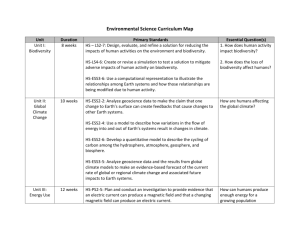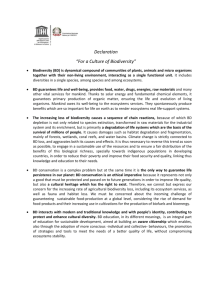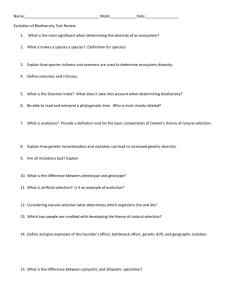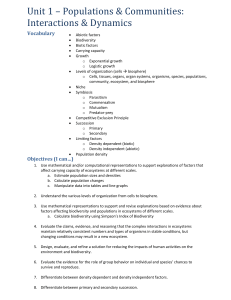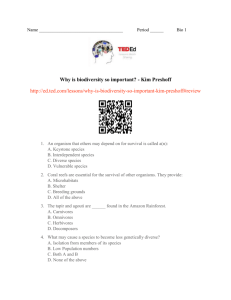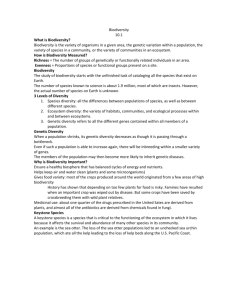Feedback Sheet - Sustainable Jersey
advertisement
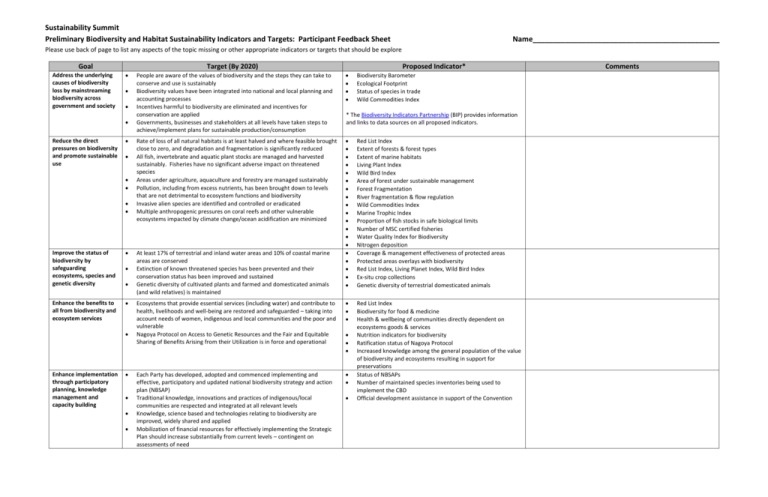
Sustainability Summit Preliminary Biodiversity and Habitat Sustainability Indicators and Targets: Participant Feedback Sheet Name______________________________________________ Please use back of page to list any aspects of the topic missing or other appropriate indicators or targets that should be explore Goal Address the underlying causes of biodiversity loss by mainstreaming biodiversity across government and society Target (By 2020) Reduce the direct pressures on biodiversity and promote sustainable use Improve the status of biodiversity by safeguarding ecosystems, species and genetic diversity Enhance the benefits to all from biodiversity and ecosystem services Enhance implementation through participatory planning, knowledge management and capacity building Proposed Indicator* People are aware of the values of biodiversity and the steps they can take to conserve and use is sustainably Biodiversity values have been integrated into national and local planning and accounting processes Incentives harmful to biodiversity are eliminated and incentives for conservation are applied Governments, businesses and stakeholders at all levels have taken steps to achieve/implement plans for sustainable production/consumption Rate of loss of all natural habitats is at least halved and where feasible brought close to zero, and degradation and fragmentation is significantly reduced All fish, invertebrate and aquatic plant stocks are managed and harvested sustainably. Fisheries have no significant adverse impact on threatened species Areas under agriculture, aquaculture and forestry are managed sustainably Pollution, including from excess nutrients, has been brought down to levels that are not detrimental to ecosystem functions and biodiversity Invasive alien species are identified and controlled or eradicated Multiple anthropogenic pressures on coral reefs and other vulnerable ecosystems impacted by climate change/ocean acidification are minimized Red List Index Extent of forests & forest types Extent of marine habitats Living Plant Index Wild Bird Index Area of forest under sustainable management Forest Fragmentation River fragmentation & flow regulation Wild Commodities Index Marine Trophic Index Proportion of fish stocks in safe biological limits Number of MSC certified fisheries Water Quality Index for Biodiversity Nitrogen deposition Coverage & management effectiveness of protected areas Protected areas overlays with biodiversity Red List Index, Living Planet Index, Wild Bird Index Ex-situ crop collections Genetic diversity of terrestrial domesticated animals Ecosystems that provide essential services (including water) and contribute to health, livelihoods and well-being are restored and safeguarded – taking into account needs of women, indigenous and local communities and the poor and vulnerable Nagoya Protocol on Access to Genetic Resources and the Fair and Equitable Sharing of Benefits Arising from their Utilization is in force and operational Each Party has developed, adopted and commenced implementing and effective, participatory and updated national biodiversity strategy and action plan (NBSAP) Traditional knowledge, innovations and practices of indigenous/local communities are respected and integrated at all relevant levels Knowledge, science based and technologies relating to biodiversity are improved, widely shared and applied Mobilization of financial resources for effectively implementing the Strategic Plan should increase substantially from current levels – contingent on assessments of need Red List Index Biodiversity for food & medicine Health & wellbeing of communities directly dependent on ecosystems goods & services Nutrition indicators for biodiversity Ratification status of Nagoya Protocol Increased knowledge among the general population of the value of biodiversity and ecosystems resulting in support for preservations Status of NBSAPs Number of maintained species inventories being used to implement the CBD Official development assistance in support of the Convention At least 17% of terrestrial and inland water areas and 10% of coastal marine areas are conserved Extinction of known threatened species has been prevented and their conservation status has been improved and sustained Genetic diversity of cultivated plants and farmed and domesticated animals (and wild relatives) is maintained Biodiversity Barometer Ecological Footprint Status of species in trade Wild Commodities Index * The Biodiversity Indicators Partnership (BIP) provides information and links to data sources on all proposed indicators. Comments
